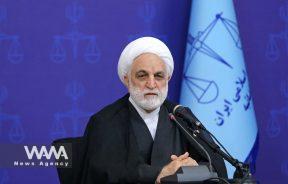Iran’s Neighbors: Playing on the Enemy’s Turf?
WANA (Apr 24) – A piece of news is circulating on social media claiming that “Trump has asked Erdoğan to remain neutral in the U.S. attack on Iran and to allow the Pentagon to use Syrian airspace.”
I am not trying to verify the authenticity of the news or determine whether it is true or not, nor am I attempting to explore Turkey’s reaction to this request or rumor. Rather, I am merely using this piece of social media news as a pretext to address the sensitive issue of the “imbalance between Iran’s security policy and foreign policy,” and to call on responsible officials and institutions to work toward resolving this imbalance.
The explanation of the issue is quite simple: All fifteen of Iran’s neighbors, from Russia as a global power to Bahrain, the smallest neighboring country in the Persian Gulf, without explicitly acknowledging it or saying a word, are confident about two particular issues related to their security.
First, there is no military threat from Iran against their independence and territorial integrity; And second, which is far more important than the first point, is that if these countries are threatened, not only will Iran not cooperate with the aggressor or the source of the threat, but it will also support their independence and territorial integrity.
However, on the other hand, there is no such assurance for Iran regarding its neighbors that they will not cooperate with those who threaten and attack Iran.
Many examples can be presented to confirm that Iran has never invaded its neighbors in its contemporary history and, on the contrary, has supported them against foreign aggression or rebels supported by foreign powers.
I won’t go too far back in history—I’ll just briefly mention the political and security behavior of the Islamic Republic of Iran in relation to its neighbors, and Iran’s clear stance throughout various stages of the Azerbaijan-Armenia war since their independence until today.
Iran has consistently pursued a stable policy emphasizing the necessity of supporting the independence and territorial integrity of both countries, and opposing any changes to the region’s geography, whether during the period when Armenia had the upper hand or now, when the situation has reversed.
Iran was attacked by Saddam Hussein’s regime and fought for eight years to preserve its independence and territorial integrity, suffering immense damages. However, during the U.S. invasion of Iraq, not only did Iran refuse to cooperate with the United States, but it also openly condemned the attack.
Many security and military matters are usually beyond the reach of experts, but even based on the limited amount of published news, it can be written that Iran had a public stance against the U.S. attack on Afghanistan, and according to American documents, Iran stood alongside the struggles of the Afghan people against the occupiers.
What Iran did for Qatar during its dispute with its larger neighbor—if it had not done so—today, a different history would have been taught in Qatari schools.
And again, what Iran did in defense of Iraq’s territorial integrity during the fight against ISIS, and later during the Kurdistan Region independence referendum, is of decisive significance. Because had it not been for Iran’s actions, today it would not have been only Iraq that had lost its territorial integrity, but Turkey too would be facing a serious threat.
Let me briefly add a point regarding Russia: the independence and territorial integrity of Iran are the most important security guarantees for Russia and the Commonwealth of Independent States (CIS) countries in Central Asia and the Caucasus.
It is necessary for those who consider themselves experts on regional security issues—regardless of their thoughts and opinions but who regard Iran’s independence and territorial integrity as a fundamental principle—to honestly reflect, at least once, on why Iran, just as it defends its own independence and territorial integrity, is also sensitive about the independence and territorial integrity of its neighbors.
And this sensitivity has not merely been at the level of declared policy, but has involved decisive actions in defense of their independence and territorial integrity.
It should not be assumed that this note is suggesting that the Islamic Republic of Iran should reconsider its security and political policy regarding the defense of the independence and territorial integrity of its neighbors.
Rather, it merely seeks to remind the country’s diplomatic apparatus that, in political negotiations with neighboring countries, it is strategically important to take this point into account:
If a neighbor has come to the conclusion that Iran not only refrains from cooperating with that country’s enemies against its independence and territorial integrity, but also stands against the aggressor and does whatever is possible to assist in defending that country’s independence and territorial integrity, then it is a legitimate and rightful expectation that Iran should hold the same expectation from its neighbor.
“Of course, one must also take into account this self-evident principle: in foreign policy, merely stating the facts is not enough to compel others to fulfill their responsibilities and behave appropriately; rather, tools must be employed to achieve this.”












